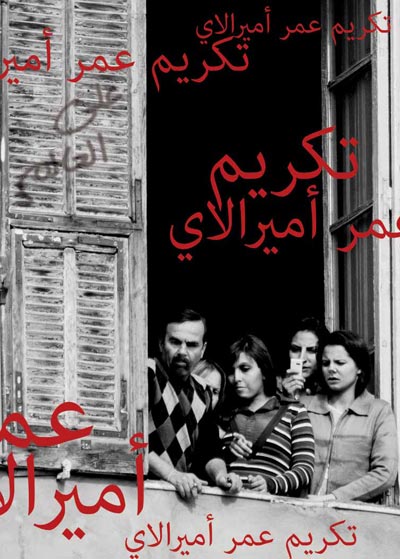Tribute to Omar Amirlay
BEYOND THE EQUIVOCAL MIRRORS OF REALITY
 Omar Amiralay left us prematurely, bequeathing nineteen documentaries, and as
many testimonies, about his faith in life as an inexhaustible source of stories to
think the present. Forty-four years between his first film Film-essay on the Euphrates
Dam (1970) to the last we know Flood in Baath Country (2004). His love for life,
Amiralay owes it to the long hours spent as a child at the window of the family home
overlooking a busy and bustling street, place of exchanges, of meetings of tying and
untying destinies.
Omar Amiralay left us prematurely, bequeathing nineteen documentaries, and as
many testimonies, about his faith in life as an inexhaustible source of stories to
think the present. Forty-four years between his first film Film-essay on the Euphrates
Dam (1970) to the last we know Flood in Baath Country (2004). His love for life,
Amiralay owes it to the long hours spent as a child at the window of the family home
overlooking a busy and bustling street, place of exchanges, of meetings of tying and
untying destinies.Unfailingly choosing documentary in a country living under the yoke of dictatorship is an act of resistance. It earned Amiralay to live ostracized before being forced into exile by a regime allergic to any dissenting voice. 1948.1956, 1967.1973 with the annexation of the Golan, the liquidation of the "Palestinian dream", it's in the context of this century marked by defeats for the Arab world that Omar Amiralay conceived his movies. Bitter, lucid, disenchanted, Amiralay never gave up in the face of the adversity of History and the failure of the regimes that make it. Amiralay's cinema refuses any immediacy of sense, any frontality. It is worked by doubt and acute awareness of the complexity of the world and the beings that inhabit it. The truth does not live in the obviousness of the image. It must be questioned, turned in all directions, interact with other images so that it finally gives birth to some relative truth, the documentary being by essence a question of point of view, therefore subjectivity in the "re –presentation" of reality.
The examination of the filmography of Amiralay highlights its eclecticism and diversity of questions that gripped him as a man and as a filmmaker. The scanning of the Syrian society as a theme and portraiture as a documentary genre are the strong lines of his work.
Daily life in a Syrian village co-directed in 1974 with Osama Mohamed and Chickens probe both the state of society and the vagaries of the Syrian bureaucracy. The undergroung political and social satire in this film culminates in A Flood in Baath Country Amiralay's latest opus in which the grotesque and theatrical nature of membership in the Baath party is embodied by the tribal chief of the village of El Machi and his nephew, a school director, caricatures of local notables responsible of the established order.
In There is so much to tell (1997), a vivid portrait of the great playwright Saadallah Wannous, Omar Amiralay performs one of his major works. Wannous dying in chemotherapy establishes a poignant accurate diagnosis on Arab culture, history and the status of the intellectual. Amiralay through the quality of his attentiveness and the device he has established, films this intellectual testimony with a gentleness and empathy to deliver what is one of the finest Arab documentaries.
Ikbal ZALILA
127 - LA VIE QUOTIDIENNE DANS UN VILLAGE SYRIEN de - SYRIA ( 1974 )
128 - LES POULES de - SYRIA ( 1977 )
129 - UN PARFUM DE PARADIS de - SYRIA ( 1982 )
130 - LE SARCOPHAGE DE L’AMOUR de - SYRIA ( 1983 )
131 - L’ENNEMI INTIME de - SYRIA ( 1985 )
132 - IL Y A TANT DE CHOSES ENCORE A RACONTER de - SYRIA ( 1997 )
133 - L´HOMME AUX SEMELLES D´OR de - SYRIA ( 2000 )
134 - DELUGE AU PAYS DU BAAS de - FRANCE ( 2004 )

